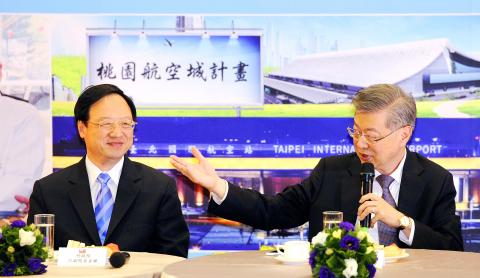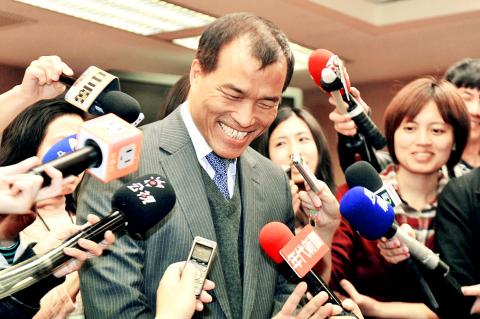|
Jiang to take over as
Sean Chen quits
CABINET RESHUFFLE: Several lawmakers criticized
the lack of changes in key economic posts, while others said the president had
again picked another close confidante
By Mo Yan-chih and Shih Hsiu-chuan / Staff reporters

Premier Sean Chen, right, is
joined by his successor, Vice Premier Jiang Yi-huah, at a press conference
yesterday. Jiang is scheduled to take over from Chen on Thursday after Chen
tendered his resignation for health reasons.
Photo: George Tsorng, Taipei Times

Deputy Minister of Transportation
and Communications Yeh Kuang-shih, center, declines to comment yesterday morning
on whether he would become minister.
Photo: Chen Chih-chu, Taipei Times
Vice Premier Jiang Yi-huah (江宜樺) will
replace Premier Sean Chen, who has resigned because of health reasons, the
Presidential Office said in a statement issued late on Thursday evening.
The statement, issued at about 11:30pm, said Chen had offered to resign on
several occasions because of poor health, but that President Ma Ying-jeou (馬英九)
only approved the resignation this week.
The statement came after the Chinese Television System (CTS) reported earlier
that evening that Jiang was to replace Chen as premier, while Minister of
Transportation and Communications Mao Chi-kuo (毛治國) would succeed Jiang as vice
premier.
The Presidential Office statement lauded Chen for his expertise and leadership
in implementing government policies — from fuel price changes to pension reforms
— and working with the president to promote social justice. It said that Ma’s
decision to appoint Jiang and Mao was made after careful consideration and
consultation with various authorities.
Chen told a year-end Cabinet press conference yesterday that he resigned to
“reverse my health condition” after a recent health examination made him
“worried about [his] health.”
Chen said the president was originally scheduled to unveil the Cabinet reshuffle
next week, but that a media leak prompted Ma to call an impromptu meeting with
him, Jiang and Mao late last night at the president’s residence, which was
followed by the midnight announcement of the changes.
He dismissed media reports that he had been “shocked” at the announcement.
Chen said Ma accepted his resignation on Monday, when the president spoke to him
by telephone. He said he first talked of his intent to step down on Jan. 16,
which was followed by a written resignation letter to Ma on Jan. 23.
Chen said he had been experiencing chest pains since the beginning of the year
and had a cardiac CT scan and other health tests on Jan. 15.
“The findings worried me a bit,” he said.
After listening to the doctor’s explanation of the test results and doing some
medical research, Chen said he realized he would not be able to reverse his
health condition unless he made substantial changes to his work and lifestyle.
The following day, he asked the president to look for his replacement and
submitted his written resignation on Jan. 23, explaining in detail his reason
for leaving.
Chen said he told Ma in the letter that he is willing to make sacrifices for the
nation, but “it would be an unbearable and irreversible burden” for him if
national interests were compromised because of his health problems.
During a telephone conversation, the president told him that after giving the
matter long consideration, he decided to accept the resignation and would
designate Jiang as premier.
Chen also denied earlier media rumors that he was being considered to succeed
central bank Governor Perng Fai-nan (彭淮南), whose third term of office expires on
Feb. 25.
At a separate setting, Jiang said he had agreed on Sunday to assume the
premiership, when Ma called him to a meeting that night and told him that Chen
was resolute about resigning because of health reasons.
“President [Ma] said he did not have the heart to persuade Premier Chen to stay
on because that could be harmful to his health,” Jiang said.
Jiang said that Ma began asking him if he was willing to take over as premier
sometime in the second half of last month, and that he told the president either
to try to retain Chen if his health permits or to consider other candidates who
are more capable.
Praising Chen for his achievements during his one-year tenure, Jiang said he
could never do a better job than Chen, but he eventually agreed to shoulder the
responsibility because Chen “needs to have a good rest” to recover.
“I am willing to undertake the task to move the [nation] forward and create a
better future,” he said.
The latest Cabinet reshuffle has consolidated Jiang’s political strength within
the KMT and sparked heated discussion about an internal power struggle among
potential top contenders for the party’s presidential nomination in 2016 —
including Vice President Wu Den-yih (吳敦義), Taipei Mayor Hau Lung-bin (郝龍斌) and
New Taipei City (新北市) Mayor Eric Chu (朱立倫).
Chu congratulated Jiang and praised him for his capabilities and profound
knowledge on various issues, saying he expected Jiang to handle national affairs
well.
Hau also lauded Jiang for his communication and execution skills, and said the
new Cabinet should strengthen its efforts to promote fiscal and economic
policies because reviving the nation’s economy is the government’s priority.
He declined to comment when asked about potential plans to run in the 2016
presidential race, stressing the importance of party unity.
Democratic Progressive Party Chairman Su Tseng-chang (蘇貞昌) criticized the
Presidential Office’s late-night announcement of the changes as “ridiculous,”
while former president Lee Teng-hui (李登輝) said it was not appropriate, adding
that matters of such scope should have been announced in daytime.
A number of pan-blue lawmakers said the Cabinet reshuffle was pointless if
officials in charge of economic affairs were not replaced, while pan-green
lawmakers said Jiang’s appointment once again showed that Ma only picks people
from his small circle of confidantes.
The Executive Yuan also announced that Vice Minister of Transportation and
Communications Yeh Kuang-shih (葉匡時) would succeed Mao, and that Taipei Deputy
Mayor Chen Wei-jen (陳威仁) would be the new Cabinet secretary-general, replacing
Steven Chen (陳士魁), who would become a minister without portfolio.
Perng will be reappointed for a fourth five-year term as central bank chief,
sources said.
The handover ceremony for the premier will likely take place on Thursday, the
sources added.
Additional reporting by Rich Chang and staff writer
|
![]()
![]()
![]()